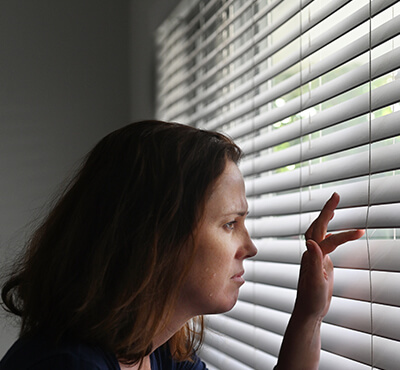Phobia Treatment in Dayton, Cincinnati, and Columbus, OH
Learn How To Manage Your Phobias: Get Help From Our Experienced Doctors Today!

Phobia Doctors Near You
KAV Mental Health & Psychiatry is a mental health disorder clinic serving patients from the Dayton, Cincinnati, and Columbus, OH areas. We use proven clinical and medical methods to help patients manage their phobias and other mental health issues.
We understand how much of an obstacle a phobia can be in a patient’s life, especially when left untreated. We work to address and ease the symptoms of the phobia and any related conditions it might be causing or caused by. Learn more about phobias below, and how KAV Mental Health & Psychiatry’s experienced phobia doctors can help.
What Are Phobias?
Phobias are uncontrollable, irrational, and lasting fears of a very specific thing. They’re a type of [anxiety disorder] that can affect anyone, regardless of age, sex, or history. The fear caused by a phobia can cause someone to lose functioning or have a panic attack, and often leads to avoidant behavior.
Phobias are defined by being an overreaction. Even when someone has a phobia of a thing that’s potentially dangerous — such as heights or snakes —the response is out of proportion. People with phobias are often aware that their fears are irrational, but that doesn’t help them control them.
Phobias can keep people from living and enjoying their lives. The fear may cause them to completely avoid events and settings that are harmless. It can impede work, school, daily tasks, or maintaining relationships because someone can’t handle the anxiety it causes.
Types of Phobias
There are two main types of phobias: complex and specific. Specific phobias center around one object, situation, or activity. They often develop during childhood or early adolescence, and may become milder as people grow older. Common specific phobias include:
Animal
Environmental
heights, deep water, thunderstorms
Bodily
Sexual
Agoraphobia
Social phobia
People with both specific and complex phobias feel intense, uncontrollable fear or anxiety during a triggering situation, and can also experience panic attacks. Sometimes, just thinking about the phobia — even when it’s not present — can cause a reaction.
Common symptoms of phobias include:
- Panic and fear
- Rapid heartbeat
- Shortness of breath
- Trembling
- A strong desire to remove yourself from the situation

There is no single cause of phobias, but there are often associated factors, such as a traumatic event. Phobias can even be learned, especially early in life; if your father had an intense fear of deep water, you may develop that same fear. Simply learning about specific threats can also lead phobias, such as learning about quicksand in school and then worrying that every patch of sand could be deadly.
There are some factors that can increase a person’s risk of certain phobias. Some are more likely to develop during adolescence and early adulthood, especially those linked to traumatic events or ongoing abuse. Genetics may play a role as well, as some people are more likely to be anxious than others.

Signs & Symptoms of Phobias

People with both specific and complex phobias feel intense, uncontrollable fear or anxiety during a triggering situation, and can also experience panic attacks. Sometimes, just thinking about the phobia — even when it’s not present — can cause a reaction.Common symptoms of phobias include:
- Panic and fear
- Rapid heartbeat
- Shortness of breath
- Trembling
- A strong desire to remove yourself from the situation
Causes & Risk Factors of Anxiety

Environmental factors and genetics both contribute to the development of an anxiety disorder, though risk factors vary for each type of disorder. General risk factors for anxiety disorders often include:
- Stressful and traumatic events, particularly in early childhood or adulthood
- Shyness, lack of confidence, or low self-esteem in childhood
- A family history of anxiety or other mental health disorders
- Some medical conditions, such as diabetes or heart disease, can also be linked to anxiety
Long-Term Effects of Phobias
When someone suffers from an intense phobia, it can make life extremely challenging. Phobias can interfere with day-to-day life as someone feels compelled to adjust their routines to avoiding a phobia. The effort to avoid triggers of phobias, or suppressing panic attacks when triggered, can cause stress and anxiety, which take a toll on the bodies.
The damaging long-term effects of stress on the body are well-documented, but phobias can also prevent people from maintaining healthy relationships with others, or from attending important life events, due to avoiding certain situations. This isolation can potentially lead to other mental health disorders, such as depression.

Phobia Counseling & Treatment with KAV Mental Health & Psychiatry
KAV Mental Health & Psychiatry offers a compassionate and comprehensive approach to phobia counseling and treatment. We personalize a treatment and therapy plan for each patient that focuses on the specific phobia disrupting their lives. Our team is knowledgeable about all areas of mental health and can determine if patients are also suffering from any other disorders contributing to their phobias, or if medication could ease any symptoms.
Patients can engage in individualized phobia counseling sessions to discuss their phobias in a safe and supportive environment with a certified professional who can help them face their fears and learn to manage their reactions. Most phobias are treatable, and our flexible one-on-one and group phobia therapy let patients work on their issues at their own pace. Medication is not typically used to treat phobias, but we may prescribe medication to help with symptoms or related conditions, such as for anxiety.
We offer treatment in an easy, accessible online video platform that is confidential and HIPPA-compliant. Our phobia doctors and counselors take appointments 6 days a week, with same-day appointments available. Phobias can be hard to live with, but KAV Mental Health & Psychiatry is here with easy-to-access online telehealth treatment when you need us.
